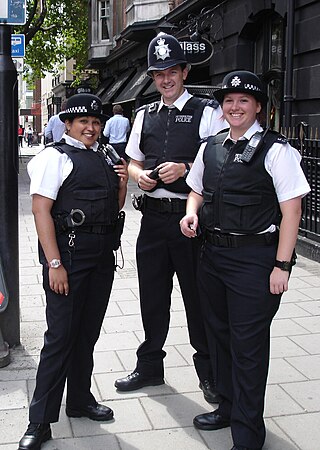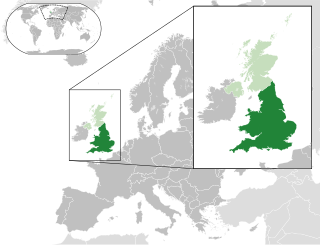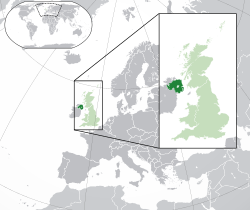
The Regulation of Investigatory Powers Act 2000 is an Act of the Parliament of the United Kingdom, regulating the powers of public bodies to carry out surveillance and investigation, and covering the interception of communications. It was introduced by the Tony Blair Labour government ostensibly to take account of technological change such as the growth of the Internet and strong encryption.

The Lord Chancellor, formally titled Lord High Chancellor of Great Britain, is a senior minister of the Crown within the Government of the United Kingdom. The lord chancellor is the minister of justice for England and Wales and the highest-ranking Great Officer of State in Scotland and England, nominally outranking the prime minister. The lord chancellor is appointed and dismissed by the sovereign on the advice of the prime minister. Prior to the union of England and Scotland into the Kingdom of Great Britain, there were separate lord chancellors for the Kingdom of England and the Kingdom of Scotland. Likewise, the Lordship of Ireland and its successor states maintained the office of lord chancellor of Ireland until the establishment of the Irish Free State in 1922, whereupon the office was abolished.

A justice of the peace (JP) is a judicial officer of a lower court, elected or appointed by means of a commission to keep the peace. In past centuries the term commissioner of the peace was often used with the same meaning. Depending on the jurisdiction, such justices dispense summary justice or merely deal with local administrative applications in common law jurisdictions. Justices of the peace are appointed or elected from the citizens of the jurisdiction in which they serve, and are usually not required to have any formal legal education in order to qualify for the office. Some jurisdictions have varying forms of training for JPs.

The Police Service of Northern Ireland, is the police service responsible for law enforcement and the prevention of crime within Northern Ireland.

Law enforcement in the United Kingdom is organised separately in each of the legal systems of the United Kingdom: England and Wales, Scotland, and Northern Ireland. Most law enforcement duties are carried out by those who hold the office of police constable of a territorial police force.

The Garda Síochána is the national police and security service of Ireland. It is more commonly referred to as the Gardaí or "the Guards". The service is headed by the Garda Commissioner, who is appointed by the Irish Government. Its headquarters are in Dublin's Phoenix Park.

The Supreme Court of the United Kingdom is the final court of appeal in the United Kingdom for all civil cases, and for criminal cases originating in England, Wales and Northern Ireland. As the United Kingdom's highest appellate court for these matters, it hears cases of the greatest public or constitutional importance affecting the whole population.

Brian Gill, Lord Gill, KSG FRSE FRSAMD FRSCM is a retired Scottish judge and legal academic. Lord Gill was Lord President and Lord Justice General and held that position for three years from 2012 until 2015. His 2007 to 2009 consultation and report into the failings of the Scottish legal system was followed by a major overhaul of the entire court system once he had been appointed Lord President.
A law commission, law reform commission, or law revision commission is an independent body set up by a government to conduct law reform; that is, to consider the state of laws in a jurisdiction and make recommendations or proposals for legal changes or restructuring.
Capital murder refers to a category of murder in some parts of the US for which the perpetrator is eligible for the death penalty. In its original sense, capital murder was a statutory offence of aggravated murder in Great Britain, Northern Ireland, and the Republic of Ireland, which was later adopted as a legal provision to define certain forms of aggravated murder in the United States. Some jurisdictions that provide for death as a possible punishment for murder, such as California, do not have a specific statute creating or defining a crime known as capital murder; instead, death is one of the possible sentences for certain kinds of murder. In these cases, "capital murder" is not a phrase used in the legal system but may still be used by others such as the media.

The Scottish Law Commission is an advisory non-departmental public body of the Scottish Government. It was established in 1965 to keep Scots law under review and recommend necessary reforms to improve, simplify and update the country's legal system. It was established by the Law Commissions Act 1965 at the same time as the Law Commission in England and Wales.

The Independent Police Complaints Commission (IPCC) was a non-departmental public body in England and Wales responsible for overseeing the system for handling complaints made against police forces in England and Wales.

The Offences against the Person Act 1861 is an Act of the Parliament of the United Kingdom of Great Britain and Ireland. It consolidated provisions related to offences against the person from a number of earlier statutes into a single Act. For the most part these provisions were, according to the draftsman of the Act, incorporated with little or no variation in their phraseology. It is one of a group of Acts sometimes referred to as the Criminal Law Consolidation Acts 1861. It was passed with the object of simplifying the law. It is essentially a revised version of an earlier consolidation act, the Offences Against the Person Act 1828, incorporating subsequent statutes.
The Northern Ireland Human Rights Commission (NIHRC) is a non-departmental public body funded through the Northern Ireland Office but operating independently of government as the national human rights institution (NHRI) for Northern Ireland. It came into existence on 1 March 1999, having been created by the Parliament of the United Kingdom through section 68 of the Northern Ireland Act 1998, in compliance with a commitment made by the UK Government in the Belfast Agreement of 10 April 1998. Its powers were amended by the Justice and Security Act 2007.
The Judicial Appointments Commission (JAC) is an independent commission that selects candidates for judicial office in courts and tribunals in England and Wales and for some tribunals whose jurisdiction extends to Scotland or Northern Ireland.
Boards of guardians were ad hoc authorities that administered Poor Law in the United Kingdom from 1835 to 1930.

The Criminal Law Act 1967 is an act of the Parliament of the United Kingdom that made some major changes to English criminal law, as part of wider liberal reforms by the Labour government elected in 1966. Most of it is still in force.

In England and Wales the Law Commission is an independent law commission set up by Parliament by the Law Commissions Act 1965 to keep the law of England and Wales under review and to recommend reforms. The organisation is headed by a Chairman and four Law Commissioners. It proposes changes to the law that will make the law simpler, more accessible, fairer, modern and more cost-effective. It consults widely on its proposals and in the light of the responses to public consultation, it presents recommendations to the UK Parliament that, if legislated upon, would implement its law reform recommendations. The commission is part of the Commonwealth Association of Law Reform Agencies.

Justices of the Supreme Court of the United Kingdom are the judges of the Supreme Court of the United Kingdom other than the president and the deputy president of the court. The Supreme Court is the highest court of the United Kingdom for all civil cases, and for criminal cases from the jurisdictions of England and Wales and Northern Ireland. Judges are appointed by the British monarch on the advice of the prime minister, who receives recommendations from a selection commission.
The Judicial Appointments Commission (JAC) recommends candidates for appointment as judges of the Appeal Court and to all judicial offices listed in Schedule 14 of the Justice Act 2002.














